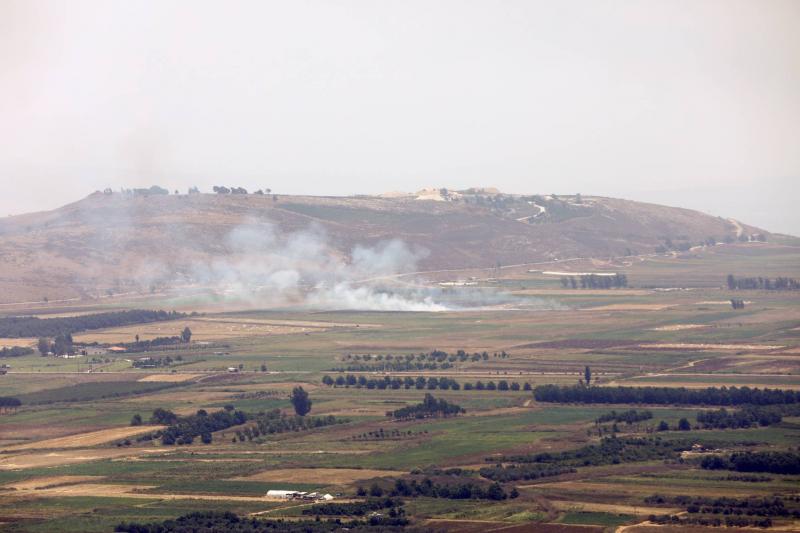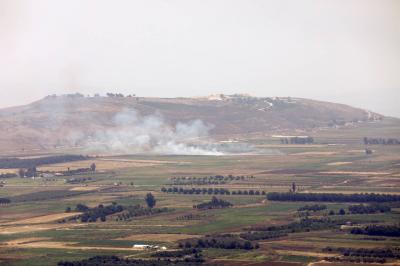While the country has not yet caught its breath following the Black Rock sedition, it entered a new phase of tension yesterday, this time from the extreme south rather than the extreme north. Meanwhile, the Lebanese are waiting for a glimmer of hope from the second visit of the French presidential envoy Jean-Yves Le Drian, who is expected to carry proposals centered around dialogue among all parties in the hope of extracting the presidential file from a stalemate that has lasted over eight months.
We received a report stating that Lebanon narrowly avoided another incident yesterday, Thursday, after rumors circulated about a rocket being fired from the south towards Israel; however, the Israeli military denied this information. Hours later, Israeli Defense Forces spokesman Avichai Adraee tweeted, "Regarding the explosion near the village of Ghajar, following an investigation by the army forces that arrived at the location, it became clear that a projectile was fired from Lebanese territory, exploding near the border inside Israeli territory. In response, the Israeli military attacked the launch area within Lebanon." The Israeli artillery targeted the outskirts of Kfarshouba and the Hilta farm. As usual, UNIFIL forces conducted communications with Lebanese and Israeli officials to prevent any further escalation in the border area.
Despite the dangerous situation, ongoing tensions at the border, and Lebanese fears of a southern front igniting, a military and strategic expert affirmed in a statement to our website that there will be no war in the south in the foreseeable future. What happened yesterday "falls within the framework of a media display by both parties, which has become a rule of engagement to relieve any arising tension." The security developments in the south will not lead to an imminent war.
Before delving into the analysis of the situation along the southern border, it is essential to shed light on recent field developments that could result in reactions slipping into a disastrous war. The Israeli military operation, considered the largest and most intense in years, in the city of Jenin in the West Bank coincided with the establishment of a new fence by Israeli forces, which included the entire northern Lebanese part of the occupied village of Ghajar into the occupied Syrian territory. Hezbollah, in a statement yesterday, deemed these measures that "separate the village of Ghajar from its historical natural surroundings within Lebanese territory, dangerous, representing a significant development and a complete occupation of the Lebanese section of the village of Ghajar by force and an imposition of facts on the ground." Furthermore, about two weeks ago, the party erected two tents in the Shebaa farms that the Israeli army insists on removing.
The Hebrew website "Walla" reported several days ago that "Hezbollah elements moved one of the tents erected by the party from the Shebaa farms, leaving one tent in place." It is known that representatives of the Israeli army's foreign relations unit lodged a complaint with UNIFIL about "Hezbollah's expansion into Israeli territory in the Shebaa farms, known in Israel as (Har Dov - Mount Ross), along the Lebanese border." An Israeli security official explained at the time that, "a diplomatic and military message was conveyed indicating that if the sites established along the border are not vacated, a cleansing operation will be executed. There is no intention to tolerate provocation, and this is yet another provocative act by Hezbollah." This has led some to consider that the phase is delicate and more dangerous than before, but one insider asserts that what is happening in Ghajar is not new. The residents of Ghajar are Syrians who were in their old village located on the line covered by UNIFIL's resolution 425. The limited geographical area behind the occupied land drives the Syrian residents northward into Lebanese territory to build what has come to be known in security terms as northern Ghajar. Recently, Israel decided to solidify a fence incorporating northern Ghajar into southern Ghajar. The two tents were erected by the residents in the Shebaa farms, just 30 meters from the fence established by Israel, taking on a symbolic character as Israel frequently works to move the fence toward Lebanese territory, subsequently sending complaints to the UN, and reporting to UNIFIL and the Americans, who have informed the government of the necessity to remove the two tents, while complaining that Lebanon has encroached on the border by 30 meters, when it has occupied and established the Lebanese part of Ghajar, thereby committing aggression while at the same time complaining.
### War Components Are Not Present at This Time
Nevertheless, despite all the new developments on both sides of the border, many politicians, experts, and military officials agree that there is no southern front, and there will not be any war in the south in the foreseeable future. Even if clashes occur in the Kfarshouba hills or in the Shebaa farms, this "takes place within the understandings regarding rules of engagement, such that areas devoid of inhabitants are targeted, and casualties cannot occur on either side." The current situation does not step outside the efforts exerted by both Hezbollah and Israel to maintain security on both sides of the blue line and to prevent any security deterioration that could lead to widespread clashes and negative interpretations that may lead to war. However, this does not mean that wars only occur due to actions taken by rational actors; wars can, in some cases, ignite due to one party's miscalculation of the situation. In that instance, the war would have broken out by accident, similar to what happened in 2006 when Hezbollah set an ambush for an Israeli patrol, leading to war, as expressed by the party's Secretary-General Hassan Nasrallah when he said: "If I had known." Consequently, neither Hezbollah nor Israel wants war, each with its considerations.
Israel will not escalate against Lebanon because its strategic interest is achieved in the south, which is stability and security. One shouldn't underestimate the significance of any incursion or violation of the blue line that Hezbollah might carry out; this will not occur. Israel is confident that the blue line is among its calmest borders with neighboring states, whether Egypt, Jordan, or the Golan. Thus, any skirmish or tension that occurs will remain within the parameters of the implicitly agreed rules of engagement. Therefore, it can be said that the blue line is monitored tightly.
Israel conducts thorough calculations before taking any steps, feeling very secure about what has been achieved through Resolution 1701. On the Hezbollah front, it understands that any war will come at the expense of its primary environment, which consists of the Shia population in the south, costing the sect billions of dollars, causing destruction and devastation, while annihilating the life savings of its supporters.
If Israel targeted military sites inside Iran, regional fronts would ignite. A resume of a retired military official states that there is no southern front unless strategic balances change at the regional level, for instance, if Israel carried out an operation targeting nuclear facilities inside Iran. In that case, war would undoubtedly break out within hours, prompting Hezbollah to be called to launch missiles at Israel as retaliation for the attack. This is the war scenario, occurring when there is an upheaval in the regional power balance. Hezbollah is more prepared to enter a regional war than a Lebanese-Israeli one. A clear indication of this was observed during the recent missile launch from the Qlayah plain, where the situation was quickly contained, and the party swiftly stated that it was not responsible for the launch, while Israel responded merely to uphold morale, asserting that "no one should attack it without retaliating," but in areas where none of the vital targets belonging to the party, the state, or the people were targeted. It was merely a token response.
In conclusion, war necessitates "components that are not available" today. No party has a justification for war, nor does any party have the capacity to withstand the harsh consequences that would befall both sides. There is no intention of war at present. As long as Hezbollah does not directly claim responsibility for any missile launch from southern Lebanon, the aftermath is swiftly contained, and the Israeli responses remain measured to maintain face before its public opinion. War is not a recreational journey, and no party can bear its responsibility. The party that fires the first missile is accountable for the war before its domestic audience and the international community and bears the consequences. Finally, it should be noted that since the moment the agreement demarcating the southern maritime borders between Lebanon and Israel was signed with Hezbollah's consent, stability will be the theme of the upcoming phase.




